Related Research Articles

The Moody Blues were an English rock band formed in Birmingham in May 1964. The band initially consisted of Graeme Edge (drums), Denny Laine (guitar/vocals), Mike Pinder (keyboards/vocals), Ray Thomas (multi-instrumentalist/vocals), and Clint Warwick (bass/vocals). Originally part of the British beat and R&B scene of the early–mid 1960s, the band came to prominence with the UK No. 1 and US Top 10 single "Go Now" in late 1964/early 1965. Laine and Warwick both left the band in 1966, with Edge, Pinder and Thomas recruiting new members Justin Hayward (guitar/vocals) and John Lodge (bass/vocals). They embraced the psychedelic rock movement of the late 1960s, with their second album, 1967's Days of Future Passed, being a fusion of rock with classical music that established the band as pioneers in the development of art rock and progressive rock. It has been described as a "landmark" and "one of the first successful concept albums".

The Steve Miller Band is an American rock band formed in San Francisco, California in 1966. The band is led by Steve Miller on guitar and lead vocals. The group had a string of mid- to late-1970s hit singles that are staples of classic rock radio, as well as several earlier psychedelic rock albums. Miller left his first band to move to San Francisco and form the Steve Miller Blues Band. Shortly after Harvey Kornspan negotiated the band's contract with Capitol Records in 1967, the band shortened its name to the Steve Miller Band. In February 1968, the band recorded its debut album, Children of the Future. It went on to produce the albums Sailor, Brave New World, Your Saving Grace, Number 5, The Joker, Fly Like an Eagle, and Book of Dreams, among others. The band's album Greatest Hits 1974–78, released in 1978, has sold over 13 million copies. In 2016, Steve Miller was inducted as a solo artist in the Rock and Roll Hall of Fame.

A Night at Red Rocks with the Colorado Symphony Orchestra is a live album by The Moody Blues, recorded from a live performance at the Red Rocks Amphitheatre on 9 September 1992. This performance was the first time The Moody Blues performed in concert backed by a full orchestra. The concert was held in celebration of the 25th anniversary of their second album, Days of Future Passed, which had featured the London Festival Orchestra. The full video of this concert was broadcast as a fundraising broadcast for PBS in the United States.

On the Threshold of a Dream is the fourth album by the Moody Blues, released in April 1969 on the Deram label. The album reached the top of the album charts, the group's first No. 1 album in the UK. According to guitarist Justin Hayward, "I think Threshold is the defining album for the Moody Blues. And it's the one in the '60's that you would find in people's homes when you went, they would have that album."
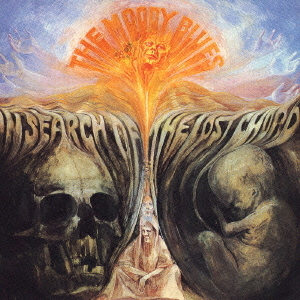
In Search of the Lost Chord is the third album by the Moody Blues, released in July 1968 on the Deram label.
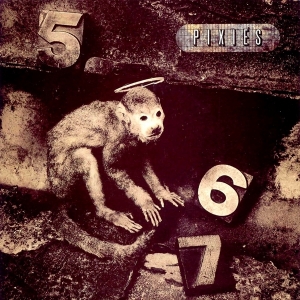
"Monkey Gone to Heaven" is a song by the American alternative rock band Pixies. Recorded in November 1988 during the sessions for the band's 1989 album Doolittle, it was released as a single in March, and included as the seventh track on the album when it was released a month later in April. The song was written and sung by frontman Black Francis and was produced by Gil Norton. Referencing environmentalism and biblical numerology, the song's lyrics mirrored themes that were explored in Doolittle. "Monkey Gone to Heaven" was the first Pixies song to feature guest musicians: two cellists, Arthur Fiacco and Ann Rorich, and two violinists, Karen Karlsrud and Corine Metter.

Raymond Thomas was an English musician, singer and songwriter. He was best known as a founding member of the English progressive rock band the Moody Blues. His flute solo on the band's 1967 hit single "Nights in White Satin" is regarded as one of progressive rock's defining moments. In 2018, he was posthumously inducted into the Rock and Roll Hall of Fame as a member of the Moody Blues.

Caught Live + 5 is a live album by The Moody Blues, consisting of a 12 December 1969 live show at the Royal Albert Hall and five previously unreleased studio recordings from 1967 to 1968.

"Pretzel Logic" is a song written by Walter Becker and Donald Fagen, released as a single by Steely Dan from their album Pretzel Logic, originally in 1974 by ABC Records. It reached number 57 in the Billboard charts.
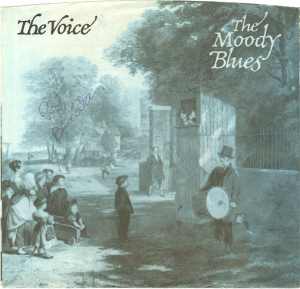
"The Voice" is a song written by Justin Hayward that was first released on the Moody Blues' 1981 album Long Distance Voyager and also as its second single. The song continued the success of previous single "Gemini Dream", becoming a Top 40 hit on the Billboard Hot 100, where it peaked at No. 15 in October 1981. The song had previously topped the Billboard Top Rock Tracks chart for four weeks during June–July 1981. The song also reached No. 9 in Canada.

"Ride My See-Saw" is a 1968 single by the English progressive rock band the Moody Blues. It was written by the band's bassist John Lodge, and was first released on the Moody Blues' 1968 album In Search of the Lost Chord. It was the second of two singles from that album, the other being "Voices in the Sky".

"Voices in the Sky" is a 1968 hit single by the progressive rock band the Moody Blues, written by their lead guitarist Justin Hayward. It was released as a UK single in June 1968, with "Dr. Livingstone, I Presume" on the B-side. It was later released on their 1968 album In Search of the Lost Chord, and was the first of two singles from that album, the other being "Ride My See-Saw".
"Legend of a Mind" is a song by the British progressive rock band the Moody Blues, and was written by the band's flautist Ray Thomas, who provides the lead vocals. "Legend of a Mind" was recorded in January 1968 and was first released on the Moody Blues' album In Search of the Lost Chord. Prominently featuring the Mellotron, it was the first song recorded for the album.
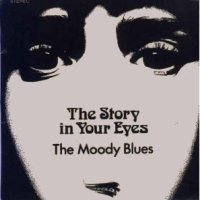
"The Story in Your Eyes" is a 1971 hit single by the English rock band the Moody Blues. Written by the band's guitarist Justin Hayward, it was first released as a single with "My Song" on the B-side, and then on the 1971 album Every Good Boy Deserves Favour shortly after.

Greatest Hits is a compilation album by the progressive rock band the Moody Blues, released in 1989. The band recorded new versions of "Isn't Life Strange" and "Question" with orchestration by the London Symphony Orchestra. The arrangements were overseen by Anne Dudley, who also produced the recordings with Justin Hayward and John Lodge. In 1990, only a year after its original release, the album was re-released as Legend of a Band: The Story of the Moody Blues with different artwork to coincide with the release of the home video documentary of the same name.
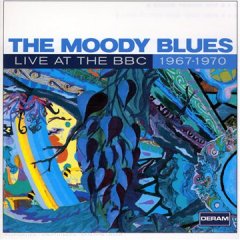
Live at the BBC: 1967–1970 is a two-disc album by The Moody Blues. Released in 2007, it features forty-one live recordings of various performances for the BBC between 1967 and 1970. The album features multiple recordings of some songs, so they are listed more than once. In 2019 the album was reissued on a numbered limited edition triple-coloured vinyl disk set.
"Om" is a song by the British progressive rock band the Moody Blues that was released in July 1968 as the final track of their album In Search of the Lost Chord. It was composed by the band's keyboardist, Mike Pinder. "Om" has a heavy Indian influence and sound to it. The word "Om", which is chanted repeatedly throughout the song, represents Aum, a sacred mantra in the Hindu, Jain, Sikh and Buddhist religions.
"The Best Way to Travel" is a 1968 song by the progressive rock band the Moody Blues. Written by keyboardist Mike Pinder, it was released on the album In Search of the Lost Chord. A wide stereo panning effect, made by the pan pots on the Decca Studios custom-built four-track recording console used during 1967–68, is noticeable on this track.
"Visions of Paradise" is a 1968 song by the progressive rock band the Moody Blues. First released on their album In Search of the Lost Chord, it was written jointly by band members Justin Hayward and Ray Thomas, and was the first of many collaborations between them. The song is primarily led by Justin Hayward's voice and Ray Thomas's flute, with the lyrics describing the writer's perception of paradise.
"To Be Alone with You" is a country-rock song by American singer-songwriter Bob Dylan, released as the third track on his 1969 album Nashville Skyline.
References
- ↑ "Dr. Livingstone, I Presume - The Moody Blues | Song Info | AllMusic". AllMusic. Retrieved 2017-08-07.
- ↑ "The Moody Blues: In Search Of The Lost Chord : Music Reviews : Rolling Stone". Rolling Stone . 2008-06-06. Archived from the original on 2008-06-06. Retrieved 2017-08-07.
{{cite magazine}}: CS1 maint: bot: original URL status unknown (link) - ↑ "The Moody Blues - Voices In The Sky / Dr. Livingstone I Presume". Discogs. 1968. Retrieved 2017-08-07.
- ↑ "The Moody Blues - Dr. Livingstone, I Presume". YouTube. 1 October 2011. Retrieved 16 August 2016.